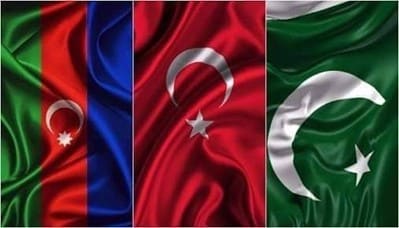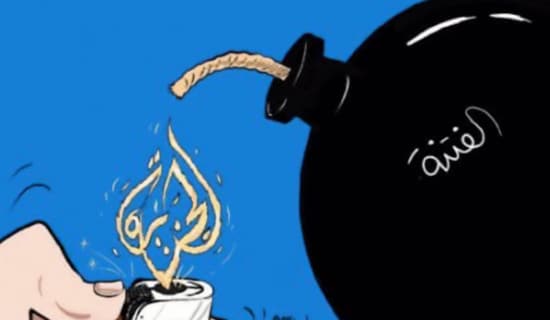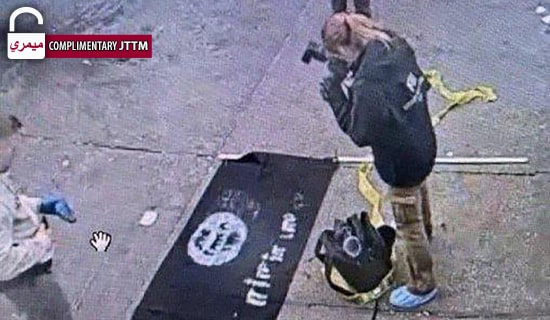On October 12, 2020, Russian magazine Ogoniok published a long report, titled "Jihad For Karabakh. Will It Threaten Russia?" on the involvement of Pakistani fighters in the conflict in Nagorno-Karabakh. The article stated that Pakistani and Afghan fighters affiliated with the Jamaat-e-Islami, Jaish-e-Muhammad, and Al-Badr movements under the supervision of the Pakistani Inter-Services Intelligence (ISI) have participated actively in the Nagorno-Karabakh conflict on the side of Azerbaijan since the 1990s.
The article stressed that the ideology of these movements is "a regional political remake of the Muslim Brotherhood project," which traditionally maintained close ties with the Turkish "Ikhwan," whose most prominent political representative is Turkish President Recep Tayyip Erdoğan. "And since... the Karabakh conflict is perceived by all supporters of the Muslim Brotherhood through the prism of Turkish interests, they regard participation in it not only as a religious war (jihad) necessary for Muslims, but also as protection of Ankara's geopolitical interests within the framework of a broad regional coalition, which includes Turkey, Azerbaijan, Pakistan, and also Hizb-e-Islami, led by Afghani politician and former mujahideen leader Gulbuddin Hekmatyar."

(Source: Azerbaijan Pakistan Turkey Brotherhood; Facebook.com/Azerbaijan.Pakistan.Turkey)
Following are excerpts from the article published in Ogoniok:
"A New Jihadi Route Appeared On The Price List Of Pakistan's Jamaat-e-Islami Recruiting Centers: Karabakh"
"First, let's see which way the wind is blowing. In the northwestern regions of Pakistan, inhabited mainly by Pashtuns, recruitment centers of the terrorist organization 'Jamaat-e-Islami' ('Islamic Society', IS), which annually sends thousands of militants to jihad in Afghanistan and Kashmir, are operating absolutely freely for about two decades.
"In fact, and this is not a secret for experts, Jamaat-e-Islami has managed to create a real 'jihad conveyor industry' in the region, relying on an unprecedented recruiting network and on effective infrastructure of muaskars (military training camps).
"Of course, a jihadi project of this magnitude would not have been possible without the covert and explicit support from government institutions. Primarily the Pakistani special services use organizations like IS to wage a hybrid war against their enemies in the regions of Kabul and New Delhi. From their point of view, this strategy pays off: it is largely thanks to the efforts of Jamaat-e-Islami and its allied terrorist groups that the war in Afghanistan is still ongoing and the situation in Kashmir periodically escalates.
"And just about a week ago, sources of the Ogoniok author in Peshawar, the capital of Pakistani Pashtunistan, reported that a new jihadi route appeared on the price list of Jamaat-e-Islami recruiting centers: Karabakh...

(Source: Kommersant.ru)
"The Karabakh Conflict Is Perceived Not Only As A Religious Jihad, But As A War To Protect Ankara's Geopolitical Interests"
"It should be noted that the IS emissaries are not newcomers to the post-Soviet space: in the mid-1990s, they were actively engaged in the civil war in Tajikistan, as well as in southern Russia. When the first Chechen war started, Jamaat-e-Islami sent, according to various sources, somewhere from several dozen to several hundred militants to the North Caucasus, to support the independence of Chechnya and wage jihad against Russian troops.
"All of them were natives of Pakistan and Afghanistan, and underwent training in Pakistani madrassas and muaskaras of IS, as well as in [those of] terrorist groups affiliated with them (Jaish-e-Muhammad and Al-Badr), many were able to fight in the ranks of the Taliban, which had only started to gain influence back then.
"The signature style of the 'jamaatch' was bestial cruelty and high efficiency in combat: Afghan and Pakistani militants mercilessly beheaded captured Russian soldiers while not holding on to their own lives in battles with the feds [federal troops].
"Pakistani and Afghan fighters raised in the terrorist 'incubators' of Jamaat-e-Islami, Jaish-e-Muhammad and Al-Badr under the supervision of the special services of Islamabad [i.e., ISI], have taken an active part in the Karabakh conflict on the side of Azerbaijan since the 1990s. However, this participation was in the format of jihadi amateur activity, so to speak, i.e., was done without external state support, so the scale was not impressive. Although the notorious Islamic solidarity already played an important role, and over time it even received an ideological decor.
"The fact is, one of the Ogoniok experts notes on condition of anonymity, that the ideology of Jamaat-e-Islami is a regional political remake of the Muslim Brotherhood project, which, in Pakistan, was always supported by the army, in particular the 'military president' (from 1978 to 1988) General Zia-ul-Haq. In Afghanistan, the spokesman for this trend was and still remains the head of Hizb-e-Islami (Islamic Party of Afghanistan, IPA) Gulbuddin Hekmatyar. In turn, the leaders of Jamaat-e-Islami and Hizb-e-Islami traditionally maintained close ties with the Turkish 'Ikhwan'. The most prominent political representative of which is the current President of the Republic of Turkey Recep Tayyip Erdoğan.
"And since, according to the expert, the Karabakh conflict is perceived by all supporters of the Muslim Brotherhood through the prism of Turkish interests, they regard participation in it not only as a religious war (jihad) necessary for Muslims, but also as protection of Ankara's geopolitical interests within the framework of a broad regional coalition. This coalition includes Turkey, Azerbaijan, Pakistan, and Hekmatyar's Afghan Hizb-e-Islami.
"I think that in this context there is every reason to trust to Vahram Poghosyan, press secretary of the President of the Nagorno-Karabakh Republic (NKR), who announced on October 7 that an agreement had been reached between the Turkish authorities and IPA leader Gulbuddin Hekmatyar on a possible transfer soon of Afghan militants to Karabakh.
"Moreover, according to the Pakistani source of Ogoniok, within the framework of allied relations with Ankara, Islamabad has already sanctioned the transfer to Azerbaijan of quite large weapons and ammunition consignments. 'It also means that, at the same time, militants of jihadi groups associated with Jamaat-e-Islami have already been sent to the Karabakh front, or that this will happen in the very near future,' points out the source. At the same time, the informants emphasize: The aforementioned is organized within the framework of Turkey's allied support from Pakistan; Azerbaijan plays a secondary role here.

(Source: Azerbaijan Pakistan Turkey Brotherhood; Facebook.com/Azerbaijan.Pakistan.Turkey)

Photo taken in Goranboy, Azerbaijan (source: Azerbaijan Pakistan Turkey Brotherhood; Facebook.com/Azerbaijan.Pakistan.Turkey, October 16, 2020).
The "Karabakh Jihad" Has Led To The Creation Of A Legal Jihadi Enclave Just 2,000 Kilometers From Moscow
"It seems that the appearance of Afghan and Pakistani militants on the Karabakh front is practically inevitable and will happen soon. In this regard, the question arises about the consequences of this 'combat migration' of jihadis, whose ideology is close not only to the Muslim Brotherhood, but also to the Taliban, and, therefore, [their ideology is also close to] al-Qaeda's doctrine, which is almost indistinguishable from the latter.
"Alas, as practice shows, there are grounds for concern: It is quite easy to bring jihadi militants and mullahs spiritually nourishing them to any unstable region of the world, but it is extremely difficult to get them out.
"In the case of the 'Karabakh jihad,' this means that a legal jihadi enclave of at least hundreds of hardened fighters motivated by strict religious doctrine and supported by large regional countries can be formed just about 2,000 kilometers from Moscow. One must be very naive not to understand that such a jihadi enclave will have a very noticeable impact on young Muslims not only in Azerbaijan and Georgia, but also on the residents of Dagestan, Chechnya, Ingushetia, and other republics of the North Caucasus.
"In fact, we are talking about the migration of pro-Taliban groups' supporters to the post-Soviet space from Afghanistan and Pakistan, who adhere to Taliban ideology as the most effective form of the 'victorious jihad.' This fact has been widely propagated by Russian-speaking agitators of Al-Qaeda and the Taliban over the past year, who speak with emotion about the United States' defeat in the nearly 20-year Afghan war.
"By the way, this will be the 'best' (of course, in quotation marks) response to the statements of those Russian politicians, diplomats, and experts who claim that the very same Afghan Taliban have no expansionist plans and will not threaten the security of the post-Soviet space (in other words – Central Asia). It is another matter that recent events show that the 'Taliban factor' can appear where it was least expected: in the South Caucasus. I wonder if Moscow and other regional capitals are ready for such a development of events?...

In Baku (source: Azerbaijan Pakistan Turkey Brotherhood; Facebook.com/Azerbaijan.Pakistan.Turkey, August 14, 2020)

Pins on the jacket of a volunteer veteran in Azerbaijan (Source: Azerbaijan Pakistan Turkey Brotherhood; Facebook.com/Azerbaijan.Pakistan.Turkey, September 21, 2020)
"If Turkey-Azerbaijan-Pakistan Will Use The Radical Sunni Factor To Its Full Capacity... Then Tehran May Well Respond"
"Arguing about the prospects of the 'jihadization' of the Karabakh conflict due to the participation of Afghan and Pakistani militants from pro-Taliban Sunni organizations in it, one more factor should be noted: in previous years, Shi'ite militants from Afghanistan also took an active part in hostilities on the side of Azerbaijan, where Shi'ites make up about 85 percent of the population...
"At that time the organization of the transfer of these armed Hazara fighters to Karabakh was organized by Karim Khalili, an influential Shi'ite Afghan politician who took the office of vice president of the country under Hamid Karzai. It can be assumed that this time not only supporters of the Sunni Hekmatyar, but also Afghan Shi'ites-Hazaras will go to the Karabakh front to defend the interests of Baku.
"However, in the case of Shi'ite militants, the situation might be more complicated than it was before. The fact is that, as it is known, in the current aggravation of Karabakh, Shi'ite Iran takes a rather friendly position toward Armenia and is definitely not going to help the Azerbaijani-Turkish-Pakistani coalition, whatever the case may be. If this 'trio' decides to use the radical Sunni factor at its full capacity, authorizing the mass transfer of Taliban, Al-Qaeda and Muslim Brotherhood supporters to the 'Karabakh jihad,' then Tehran may well respond by mobilizing Syria, Afghanistan, and Pakistan, but this time in order to support Armenia.
"Considering that the Iranian special services were able to create the 'Fatimiyun' division during the Syrian war, which entirely consists from Afghan Shi'ite Hazaras, (numbering up to 25,000 militants), the response to Sunni jihadi militants from Afghanistan and Pakistan can be devastating. The Shi'ite jihad, as recent events in Iraq and Syria show, is as brutal and effective as the jihad of Sunni militants.
"As a result, the current line of the Karabakh front might also become a battlefield of two jihads: the Iranian-Shi'ite jihad, supporting Armenia, and of the pro-Taliban-Sunni jihad, defending Azerbaijan and Turkey. Time will tell. In any case, the prospect of jihadization of the oldest armed conflict in the post-Soviet space (which is the zone of strategic interests of Russia) is an extremely serious challenge for Moscow.
"It seems that now, it would make sense for Russian politicians to start using the mechanism of 'shuttle' diplomacy as much as possible in order to get guarantees from Islamabad, Kabul, and Doha that the militants of Taliban, Hizb-e-Islami, Jamaat-e-Islami, Jaish-e-Muhammad, Al-Badr, and other terrorist groups will not appear near the borders of Russia. Just because it will be extremely difficult to drive them out later.
"Apparently, the corresponding signals should also be given to Ankara and Baku. At least the message that one should 'clean up' after the end of the acute phase of the Karabakh confrontation. Because if those who today organize the transfer of jihadis from Afghanistan, Pakistan and other countries to the 'Karabakh jihad,' later will not ensure the removal of the surviving militants to their places of permanent residence, then Russia will have to do this job with its own armed forces."
[1] Kommersant.ru, October 12, 2020. Ogoniok magazine is published by Kommersant. The article was written by Andrey Serenko, an analyst at the Russian think tank Center for the Study of Contemporary Afghanistan.




